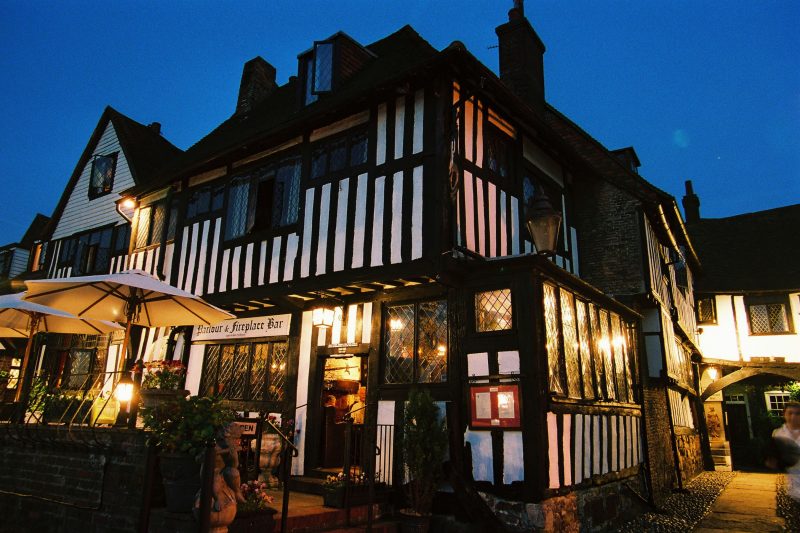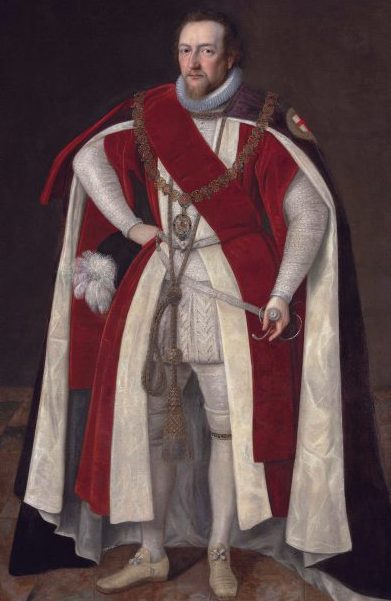On Saturday August 27, 1597, the last day of Thomas Hamon’s mayoralty, the Rye Chamberlain’s boxes were opened and 20 shillings was put into the hand of William Shakespeare or one of the players in his Company, The Lord Chamberlain’s Men. The next day, John Fowtrell, landlord of the Mermaid Inn, became the new Mayor of Rye.
The facsimiles of the original documents revealing these events, have recently become available worldwide, thanks to their online publication by the Folger Shakespeare Library in Washington DC. Yet little has been brought to light about the visit to Rye of Shakespeare’s troupe, until now.
This year’s Rye Arts Festival, intends to mark the visit of Shakespeare and his company of actors with an inaugural lecture at the Mermaid Inn. It will be delivered by Professor Andrew Hadfield of Sussex University, and is introduced by former Rye resident Paul Franczak, for a long time a teacher at Homewood School, Tenterden, who brought the full facts to light.
The 2017 inaugural Shakespeare in Rye lecture, will take place on Sunday, September 17, as part of this year’s Rye Arts Festival, at the Tudor Room, the Mermaid Inn. Ticket information will be available after the Festival launch on July 23.
So how did all this come about?
The record of the payment of 20 shillings, inscribed in Elizabethan Secretary hand, appears in the original Chamberlain’s Account Book from Rye Corporation. The Corporation archives are now held by the Sussex Archive at the Keep, in Falmer. The document of the payment and the document showing the date of the opening of the boxes, have never been reproduced in facsimile before now.
A few eminent Shakespearean scholars conflated the dates for the Players’ visit – one at least, E.K. Chambers, stating it took place in 1596 not in 1597. By getting the date wrong, a fascinating story was missed.
The record in the Rye Chamberlain’s Accounts for August 27, 1597 states:
“Paid as a reward to my Lord Chamberlain’s Players at the assignement of Mr Maior XXs”
The ‘Mr Maior’ of Rye at the time was Thomas Hamon, and the new Mayor, elected as was traditional, on the Sunday following St Bartholomew’s Day, was John Fowtrell.

Fowtrell had married Cicely Didsbury, the widow of William Didsbury, who had owned the Mermaid. It was not difficult to obtain the Will of William Didsbury from the National Archive. This reveals that he bequeathed the Mermaid Inn to Cicely. So Fowtrell became landlord of the Mermaid Inn, and both he and Thomas Hamon would have seen the performance by Shakespeare’s Company and paid the men.
In the same accounts book, two pages before the payment is recorded, is the date when Rye’s ‘boxes’ containing revenues, were opened. This was an important discovery, not least because other institutions, including the Toronto University, Records of Early English Drama (REED Volumes) had previously placed the date of the Rye visit after September 3. But this is wrong. It throws out the itinerary for the rest of the provincial tour. For example, it does not give enough time for the Players to arrive in Dover, where their visit is also recorded, and where they performed before they moved on to Bristol and Marlborough, which they probably reached by sea.
Judith and Martin Blincoe, owners of the Mermaid Inn in Rye were contacted about these discoveries, as was the Folger Shakespeare Library in Washington. The Folger were interested in including the original documentation and an explanation of the sequence of events, as part of their permanent online exhibition and asked for an article to accompany the documentation. As Heather Wolfe, the Folger Archivist explained: “We were interested in recording where Shakespeare may have been at any one time.” Paul Franczak’s goal was not only to put Rye on the map with the world-renowned Shakespeare Library in Washington, but to encourage Rye residents to celebrate this little-known part of their history.
In July 1597, Thomas Nashe and the writer Ben Jonson co-wrote a play, The Isle of Dogs which was performed at the Swan by Pembroke’s Men. The order from the Privy Council to ‘plucke down’ the London theatres may have been influenced by this play, no longer extant, which was considered ‘seditious’. It is probably true that three consecutive years of poor harvests and famine had increased the potential for riot of playgoers and influenced the authorities’ decision. Some London theatres could hold up to 3,000 people. Whatever the cause, the closure undoubtedly propelled The Chamberlain’s Men to make plans for their provincial tour.

The background to the story of the Isle of Dogs also encompasses Queen Elizabeth’s torturer-in-chief, Richard Topcliffe and her Secretary of State Robert Cecil, brother-in-law to the 11th Lord Cobham. In the Elizabethan period, the unpopular Cobhams, father and son, were well-known to the people of Rye. William Brooke, 10th Lord Cobham, had been Lord Warden of the Cinque Ports, until his death in March 1597. The time when the Lord Chamberlain’s Men visited Rye coincided with fierce rivalry for the vacant position of Lord Warden, between the Players’ patron George Carey, who was Lord Chamberlain, and Henry Brooke, 11th Lord Cobham.
Rye mayor-making was a public event until 1603, presenting opportunities for a performance of a drama that fitted the political context of the moment.
If one wanted to speculate as to which play may have been performed in the 1597 Rye mayor-making festivities, one play, The Merry Wives of Windsor is a possibility. It would have been in the Players’ repertoire for the tour, and it contained satirical references to Lord Cobham and the Brooke family.
Cobham’s elevation as Lord Warden of the Cinque Ports, eventually occurred on September 30, Michaelmas, when the Lord Chamberlain’s Men had reached Bristol and Marlborough on the final leg of their provincial tour.
The relevant documents can be found at the Folger Shakespeare exhibition online.
Photos: Rosie Brocklehurst Franczak and library images




OMG Sir, heard through LinkedIn you are still trying to educate us all. Glad to hear that you remain well. Many thanks for all you taught me at Homewood & for inspiring to still be involved with English Lit. more now as an adult. Living in London since 1991 has given me the opportunity to meet several actors. Although sometimes still a slow learner still remember you. Best wishes,
Helen Ager (now Aldridge).